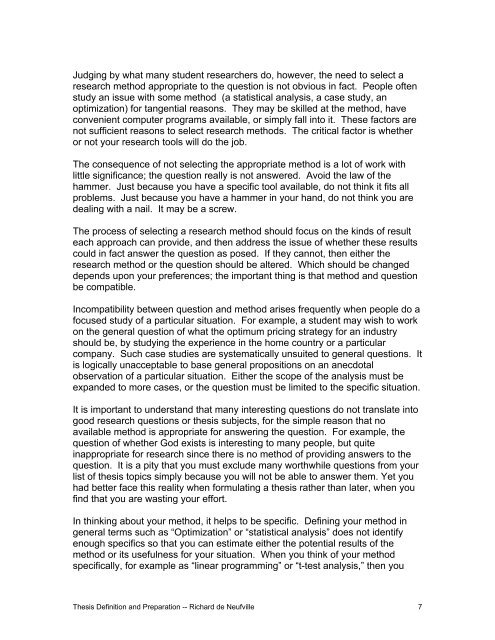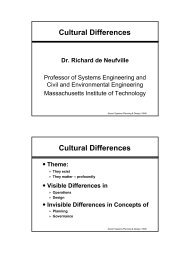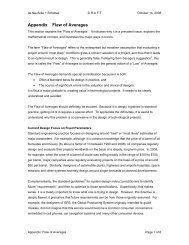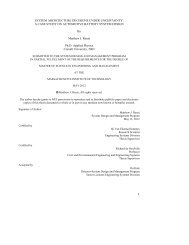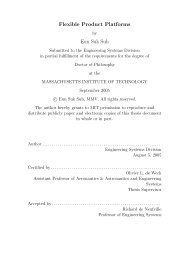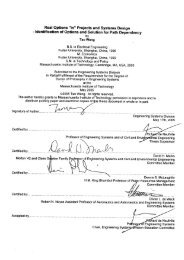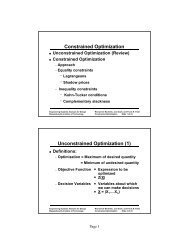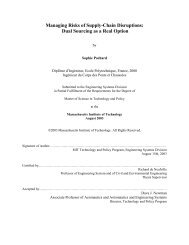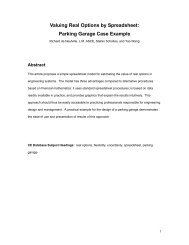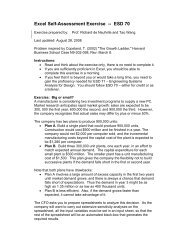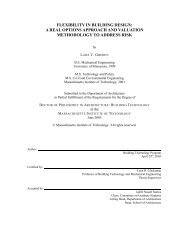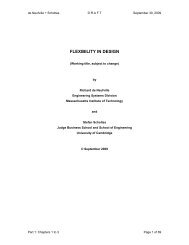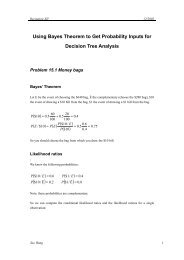Richard de Neufville's TPP SM Thesis Manual - Title Page - MIT
Richard de Neufville's TPP SM Thesis Manual - Title Page - MIT
Richard de Neufville's TPP SM Thesis Manual - Title Page - MIT
- No tags were found...
You also want an ePaper? Increase the reach of your titles
YUMPU automatically turns print PDFs into web optimized ePapers that Google loves.
Judging by what many stu<strong>de</strong>nt researchers do, however, the need to select aresearch method appropriate to the question is not obvious in fact. People oftenstudy an issue with some method (a statistical analysis, a case study, anoptimization) for tangential reasons. They may be skilled at the method, haveconvenient computer programs available, or simply fall into it. These factors arenot sufficient reasons to select research methods. The critical factor is whetheror not your research tools will do the job.The consequence of not selecting the appropriate method is a lot of work withlittle significance; the question really is not answered. Avoid the law of thehammer. Just because you have a specific tool available, do not think it fits allproblems. Just because you have a hammer in your hand, do not think you are<strong>de</strong>aling with a nail. It may be a screw.The process of selecting a research method should focus on the kinds of resulteach approach can provi<strong>de</strong>, and then address the issue of whether these resultscould in fact answer the question as posed. If they cannot, then either theresearch method or the question should be altered. Which should be changed<strong>de</strong>pends upon your preferences; the important thing is that method and questionbe compatible.Incompatibility between question and method arises frequently when people do afocused study of a particular situation. For example, a stu<strong>de</strong>nt may wish to workon the general question of what the optimum pricing strategy for an industryshould be, by studying the experience in the home country or a particularcompany. Such case studies are systematically unsuited to general questions. Itis logically unacceptable to base general propositions on an anecdotalobservation of a particular situation. Either the scope of the analysis must beexpan<strong>de</strong>d to more cases, or the question must be limited to the specific situation.It is important to un<strong>de</strong>rstand that many interesting questions do not translate intogood research questions or thesis subjects, for the simple reason that noavailable method is appropriate for answering the question. For example, thequestion of whether God exists is interesting to many people, but quiteinappropriate for research since there is no method of providing answers to thequestion. It is a pity that you must exclu<strong>de</strong> many worthwhile questions from yourlist of thesis topics simply because you will not be able to answer them. Yet youhad better face this reality when formulating a thesis rather than later, when youfind that you are wasting your effort.In thinking about your method, it helps to be specific. Defining your method ingeneral terms such as “Optimization” or “statistical analysis” does not i<strong>de</strong>ntifyenough specifics so that you can estimate either the potential results of themethod or its usefulness for your situation. When you think of your methodspecifically, for example as “linear programming” or “t-test analysis,” then you<strong>Thesis</strong> Definition and Preparation -- <strong>Richard</strong> <strong>de</strong> Neufville 7


